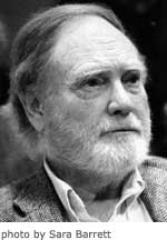Coming home with the last load I ride standing
on the tongue of the trailer, behind the tractor
in its hot exhaust, lank with sweat
in September sunlight, my arms strung
awkwardly out along the hayrack, cruciform.
Near five hundred bales we’ve put up this
afternoon, Marshall and I, and I feel it.
It makes me think of another who hung
like this on another cross. My hands are torn
by baling twine, not nails, and my side is pierced
by my ulcer, not a lance. The acid in my throat
is only hayseed. Yet exhaustion and the way
my body hangs from twisted shoulders, making
two cords that suspend me on points of pain
in the rising monoxide, recall that greater
suffering. Well, I change grip and the image
fades. It’s been an unlucky summer. Heavy rains
brought on the grass tremendously, a monster crop,
but wet, always wet; haying was long delayed.
Now this is the last chance to bring in
the winter’s feed, and Marshall needs help.
We cut, rake, bale, and draw the bales
to the barn, these late, half-green,
improperly cured bales; some of them weigh
150 pounds, yet all must be lugged by the twine
to the trailer, tossed up on the load, and then
at the barn unloaded on the conveyor
and distributed in the mow. I help, trying
my best—the desk-servant, word-worker—
and hold up my end fairly well too; but ah,
the close of day, how I fall down then.
My hands are sore, they flinch
when I light my pipe. I think of those
who have done slave labor, less able and
less well prepared than I. My wife
in the rye fields of Saxony, her father
in the camps of Moldavia and the Crimea, and
all clerks and housekeepers herded
to the gaunt fields of torture. Hands
too bloodied cannot bear
even the touch of air, the touch of love.
I have a friend whose grandmother cut cane
with a machete until one day she snicked her hand off
and took it and threw it grandly at the sky. Now
in September our New England mountains
under the clear sky for which we’re thankful at last
begin to glow, the maples and beeches and birches
put on their first color. I look
beyond the famous hayfields to the famous hills
and the notch where the sunset is beginning,
then in the other direction, eastward,
where a pale full moon like a pink medallion
hangs in a lavender cloud behind the barn.
My eyes sting with sweat and beauty. Who
is the Christ now if not I? It must be so.
My strength is certain. I stand up high
on the wagon tongue in my whole bones to say
woe to you, watch out
you sons-of-bitches who would drive men and women
to the fields where they can only die.







